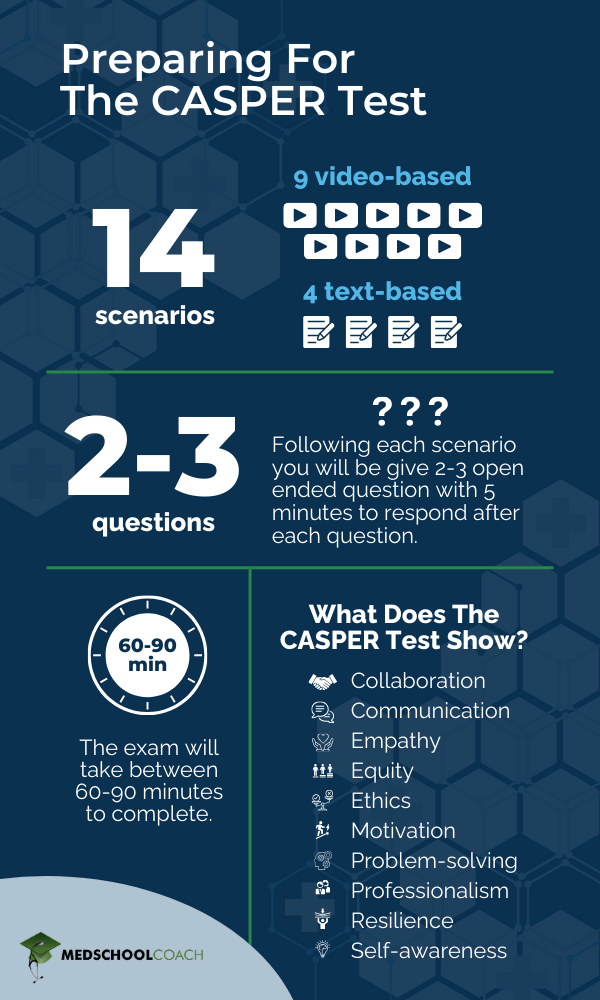
Table of Contents
The Casper test is distributed by Acuity Insights (formerly Altus Assessments). Medical schools use it to holistically evaluate how an applicant aligns with their program outside of discrete scores like your GPA or MCAT score. This test demonstrates students’ communication and interpersonal skills, not scientific knowledge.
Typically, the Casper (originally capitalized “CASPer”) is administered prior to an in-person or virtual interview at a medical school and is considered part of the secondary application process. At certain medical schools, you may need to take the test earlier (before or around the same time as you submit your primary application(s)).
Keep reading for everything you need to know about Casper exams, plus how to prepare for the test.
Prepping for Casper and other SJTs? Download our FREE Virtual Assessment Guidebook to learn everything you need to know to ace your test!
What Is the Casper Exam?
Casper stands for “Computer-based Assessment for Sampling Personal Characteristics.” It’s an open-response, online, situational judgment test (SJT) designed to evaluate professionalism and non-cognitive skills, like collaboration, problem-solving, ethics, and empathy — not scientific and medical knowledge.
Learn More: AAMC’s PREview SJT (Casper Alternative)
Medical schools and residency programs may use the Casper exam in addition to the traditional medical school interview. Some don’t use it at all. You need to check with your program or institution to see what is required during the application process.
What does the Casper test assess? Rather than judging objectively correct or incorrect responses, the Casper test assesses the following subjective behavioral characteristics:
- Collaboration
- Communication
- Empathy
- Equity
- Ethics
- Motivation
- Problem-solving
- Professionalism
- Resilience
- Self-awareness
Is Casper Required to Get into Medical School? (Plus a School List)
Many medical schools, but not all, require applicants to take the Casper test during the admissions process. We’ve included a current list of these institutions below. (Be aware that they change every year.)
LISTEN TO THE PODCAST: Are You Thinking About the Casper Exam?
Many graduate programs and residencies use the Casper exam, and a few undergraduate programs do, too. Check with your school or program to see if Casper is required.
What medical schools require Casper? Visit AcuityInsights.com or AAMC’s handy PDF for a current list of all schools and programs around the world that use the Acuity Insights in their admissions screening process.
US MD Schools That Require Casper
- Baylor College of Medicine
- Boston University Aram V. Chobanian & Edward Avedisian School of Medicine
- Burnett School of Medicine at TCU (Duet required)
- California University of Science and Medicine
- Central Michigan University College of Medicine (Casper recommended, not required)
- Donald and Barbara Zucker School of Medicine at Hofstra/Northwell
- Drexel University College of Medicine
- East Tennessee State University James H. Quillen College of Medicine (Duet required)
- Hackensack Meridian School of Medicine (HMSOM) (Duet required)
- Indiana University School of Medicine
- Louisiana State University School of Medicine in New Orleans
- Medical College of Georgia at Augusta University
- Medical College of Wisconsin
- Meharry Medical College
- Michigan State University College of Human Medicine (Choice of Casper or PREview; Duet recommended)
- Netter School of Medicine Quinnipiac University
- New York Medical College
- Renaissance School of Medicine, Stony Brook University
- Rush University Medical College
- Rutgers University, Robert Wood Johnson Medical School (Choice of Casper or PREview)
- Temple University Lewis Katz School of Medicine
- Texas A&M University Health Science Center College of Medicine
- Texas Tech Health Sciences Center El Paso Paul L. Foster School of Medicine
- Texas Tech University Health Sciences Center School of Medicine (Duet required)
- Tulane University School of Medicine (Casper and Duet recommended, not required)
- University of Colorado School of Medicine
- University of Nevada, Reno School of Medicine (Duet required)
- University of Texas at Tyler School of Medicine (Duet required)
- University of Texas Health Science Center Houston, McGovern Medical School
- University of Texas Health Science Center San Antonio, Long School of Medicine (Duet recommended)
- University of Texas Medical Branch John Sealy School of Medicine (Duet required)
- University of Texas Southwestern
- University of Vermont Larner College of Medicine
- Virginia Commonwealth University School of Medicine
- Wake Forest University School of Medicine
US DO Schools That Require Casper
- Arkansas College of Osteopathic Medicine (Casper recommended, not required)
- Sam Houston State University College of Osteopathic Medicine (Duet required)
- Touro College of Osteopathic Medicine, New York & Montana (Duet required)
- Touro University Nevada (Duet recommended)
Canada Medical Schools That Require Casper
- Dalhousie University Faculty of Medicine
- McGill University Faculty of Medicine and Health Sciences
- McMaster University, Michael G. DeGroote School of Medicine
- Memorial University of Newfoundland Faculty of Medicine
- Queen’s University Faculty of Health Sciences
- University of Ottawa Faculty of Medicine
- Université de Montréal Faculty of Medicine
- Université de Sherbrooke (except First Nations and Inuit)
- University of Alberta Faculty of Medicine & Dentistry
- University of Manitoba
- University of Saskatchewan College of Medicine
When to Take the Casper Test
You should take the Casper exam early in the cycle, no later than May. We recommend scheduling your Casper date in March or April, but those dates may fill up fast. Taking it in May of your application year is fine, but make sure it doesn’t conflict with your MCAT exam date or study crunch time.
More and more schools are requiring your Casper to be submitted with your primary application. Look up your school’s unique guidelines. It will take about 3 weeks for Casper scores to be distributed to schools, so plan early.
A common mistake when applying to medical school is waiting too long to schedule admissions exams like Casper or PREview. Remember, Casper has limited spots each month, and some of your schools may not consider your application “completed” until you submit Casper scores.
Remember: You can only take one Casper exam per application cycle.
Also, your Casper test results are only valid for the current application cycle. Any future reapplications to even the same program will require you to retake Casper. So don’t schedule your Casper date a year early.
Learn More: Best Medical Schools for Non-Traditional Students
Need Casper coaching? Talk to a MedSchoolCoach team member to learn how we can help you feel prepared for the test.
How to Sign Up for the Casper Test
You can sign up for the Casper test on the Acuity Insights website. The test is offered monthly, with additional test dates available during the summer to accommodate the busiest part of the application cycle. When registering, you’ll choose a program, a school, and a test day.
Even though you choose a school when signing up, your Casper score can be submitted to multiple schools as long as the same Casper test type is required for each school.
The requirements to take the Casper test are:
- A quality, stable internet connection
- Computer equipment, including a webcam and microphone
- A government-issued photo ID, such as a driver’s license
- A valid email address
- Money to pay the test fee
How Much Does the Casper Test Cost?
The cost varies by academic program. Most American students will pay $85 for the test and sending results to one school, plus $18 per additional school where they send the results — meaning that sending your Casper results to three schools will cost $121.
A handful of US-based Fee Assistance Programs can provide financial aid for eligible applicants. Proof of acceptance to these programs is required to take Casper at no cost. Acuity Insights honors fee assistance programs for pre-meds through:
- AAMC
- AACOMAS
- Texas JAMP
Read Next: 2025/26 TMDSAS Application Guide for Prospective Doctors

Test Format
The Casper test includes 14 dilemmas or scenarios, each followed by open-ended questions, with 5 minutes to respond to each question. Think of Casper as an automated set of multiple mini interviews (MMIs). Below is a summary of the test format.
- Part 1: The video response section where you are presented with 2 word-based scenarios and 4 video-based scenarios. Following each scenario will be 2 questions. You will have 1 minute to record your response via webcam to each of the 2 questions.
- Part 2: The typed response section where you are given 3 word-based scenarios and 5 video-based scenarios. Following each scenario, you are given 5 minutes to type responses to 3 questions.
Pro Tip: If you’re worried about your typing speed, use bullet points.
At the beginning of 2023, after Altus and One45 merged, the Casper test changed to make the video section come before the typed sections to prevent any typed answers from being lost due to video uploading issues.
What kinds of questions are on the Casper test? Casper questions tend to include a range of medical, ethical, and behavioral scenarios. Many questions are not medically or scientifically related. Below are the types of questions you’ll be asked on Casper, after a passage of context:
- What would you do in this situation? (For example, do you tell your study partner to abide by school policy, or do you let her continue to use AI to write sections of a group project?)
- How could you prevent or improve this situation? (For example, how would you resolve the tension among your coworkers?)
- How have you dealt with real-life challenging situations? (For example, when is a time you had to resolve a conflict with a friend?)
- What do you think about this controversial topic or policy? (For example, what are your thoughts on the phrase, “Pull yourself up by your own bootstraps.”?)
- More broadly, what do you think about this? (For example, what do you think makes the best team?)
Casper vs. Duet
The Snapshot, Duet, and Casper are three distinct but related parts of the Altus Suite Insights.
- Casper: This situational judgment test assesses your ability to navigate complex, real-world scenarios. It focuses on ethical decision-making, empathy, and critical thinking — not scientific knowledge. It’s 90-110 minutes long.
- Duet: This value alignment assessment aims to match applicants’ personal values and preferences with the ethos and culture of prospective medical schools or residency programs. It is typically about 15-20 minutes in length. The format has 30 program characteristics that are compared in pairs across 3 categories, with no time limits.
- Snapshot: This one-way video response tool gauges a medical student’s communication skills and personal motivation. It is about 10-15 minutes long. No medical schools require Snapshot since the 2022/23 application cycle.
How Is the Casper Test Scored?
The Casper exam is not scored based on correct or incorrect responses. Instead, raters from a diverse range of professions and backgrounds will score your responses between 1 (lowest) and 9 (highest). No single rater will rate more than one response, to eliminate any potential bias.
Your overall score from all raters is tallied and compared to other students who took the same Casper test. Based on this comparison, you will be assigned a quartile score, indicating the range of test-takers you outperformed:
- 1st Quartile: You scored lower than 75% of test-takers.
- 2nd Quartile: You scored lower than 50% of test-takers, but better than 25%.
- 3rd Quartile: You scored better than 50% of test-takers, but lower than 25%.
- 4th Quartile: You scored better than 75% of test-takers.
This quartile score is the only information you as the test-taker will receive. On the other hand, schools receive your exact percentile score and what Casper calls a “z-score,” which indicates how many standard deviations your performance was from the mean.
What Casper Doesn’t Score
For testers with a slower typing speed, if you don’t finish answering within the allotted 5 minutes, raters will try to understand your train of thought.
Any bullet points or unfinished sentences will contribute to your score.
Raters are instructed to ignore spelling and grammar mistakes, focusing on content alone.
What Counts as a “Good” Score?
A 4th-quartile Casper result is the best score since it shows you were in the top 25% of test takers. As an applicant, you will only receive a quartile score from Casper, even though AdComs will see the exact “z-score.”
Many medical admissions boards also consider the 3rd quartile a good score depending on how rigorous their acceptance standards are.
1st-quartile and 2nd-quartile results are the lowest, but they don’t necessarily disqualify your application.
Read Next: Easiest Medical Schools to Get Into
How to Prepare
Unlike traditional academic tests such as the MCAT, you do not need to “study” for the Casper exam. This test is designed to determine your normal response to a given situation. Raters aren’t seeking correct or incorrect facts, so you don’t need to memorize answers.
How do I prepare for the Casper test? There are a few ways you can prepare for the Casper and reduce your test anxiety:
- Understand what the Casper evaluates. The best method of Casper test prep is to learn more about Casper before taking the exam. Search on YouTube for common sample questions that Casper is likely to ask, and speak with other applicants who have already taken the exam. Look up Casper FAQs to get an understanding of the format of the test.
- Take practice Casper exams. You can find practice tests online that contain sample Casper questions and simulations, including official practice questions from Acuity Insights. Keep in mind that this test is designed to be hard to study for, so don’t overwork yourself with practice scenarios.
- Practice your video and typing skills. Your Casper responses are submitted by video or typing. So film yourself giving the answers, and improve your typing speed and accuracy before the test. You only get 5 minutes to deliver the typed response on test day. Watch your practice video responses to adjust your tone, body language, and eye contact.
- Take a Casper prep course. The MedSchoolCoach Casper Prep program is perfect for Casper prep. Our program includes a condensed mini-course that explains the key characteristics of Casper, 2 simulated Casper exams with video and text-based scenarios, and a 1-on-1 feedback session from a Physician Advisor.
FAQ
The entire test takes around 90-110 minutes to complete. Optional breaks are offered throughout the test.
Acuity Insights provides special accommodations for test takers who need additional time, assistive software, or dedicated personnel. A qualified professional can help you fill out a request form. It takes up to 7 business days for a response, and Acuity Insights will contact you with the outcome. An approved accommodations status is valid for two admission cycles.
If you’re better at critically thinking on your feet than memorization, the Casper test shouldn’t be too hard. If you prefer memorizing a set of information to communicating impromptu, the Casper exam may be hard for you.
The Casper exam generally requires much less studying than other medical admissions tests, but it also uses a less objective grading system.
You may take the Casper once per application cycle. If you’ve taken it once during this cycle, you cannot retake it until the cycle resets, which typically occurs every May
Read Next: How to Successfully Reapply to Medical School and Get a “Yes!”
First used in Canada in 2010, Casper has now been adopted by more than 50 United States-based medical schools and more than 100 residency programs.
Prior to 2023, the Casper exam was 1 of 3 exams that comprise the Altus Suite, a multi-part assessment used in medical school admissions cycles. (The others were Duet and Snapshot.)
In 2023, Altus Assessments and One45 merged to become Acuity Insights. After much research, Acuity Insights made slight changes to the Casper test, including the decision to combine the scores for typed and video responses to make admissions more equitable.
Everything You Need for a Top Casper Score
MedSchoolCoach has created a comprehensive Casper prep tool to help you achieve a top-quartile score and boost your chances at admissions. Designed by expert physician advisors, this resource gives expert insight into approaching the Casper exam with confidence.
Included in our Casper coaching tool is:
- A condensed mini-course that explains key characteristics of Casper
- 2 simulated Casper exams, complete with proprietary video and text-based scenarios
- A 45-minute feedback session with a physician advisor who has served on a medical school admissions committee
Over 99% of students who use our Casper Prep tool feel well prepared to take the real exam. Let us help you build your Casper skills and land the interview invites you deserve.

Sahil Mehta MD
Dr. Mehta is the founder of MedSchoolCoach and has guided thousands of successful medical school applicants. He is also a practicing physician in Boston where he specializes in vascular and interventional radiology.





